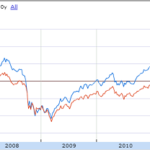The deals space is heating up – one analyst says to expect a $20 billion merger in 2013 – as companies think about how to use cash balances and low interest rates to their advantage. For investors, the question is how can one use this knowledge to make a profit.
Fund managers think merger arbitrage ETFs are the way to go. This week, ProShares listed a new ETF seeking to make money on mergers and acquisitions. The fund trades as the ProShares Merger ETF (MRGR), which will compete directly with Index IQ’s Merger Arbitrage ETF (MNA).
How Merger Arbitrage ETFs Work
What makes for merger arbitrage is up to the manager. IndexIQ and ProShares have very different opinions of how merger arbitrage should work.
- Index IQ’s Merger Arbitrage ETF (MNA) buys shares in a company waiting for an already announced takeover then shorts the global stock markets to hedge out stock performance. The result is that the fund has a directional wager, hoping that the return generated from the spread between the current market price of a stock and its takeover price is larger than the positive change of the global stock markets during the same period.
- ProShares’ Merger ETF (MRGR) will buy and hold positions in up to as many as 40 mergers, and use short positions only when the acquirer includes stock in the transaction. In all-cash deals, the ProShares Merger ETF (MRGR) will go long-only the stock of the target company in the acquisition. The fund is being called a “pure-play†for this reason; it takes position only in the companies actively involved in the merger and does not seek a proxy to hedge out global stock market returns.
As you can see, these strategies are very different. Index IQ’s ETF is contingent on the relative performance of the targets in an acquisition vs. global stock markets. ProShares’ Merger ETF (MRGR) is a pure-play on merger and acquisition deals.
Returns from Merger Arbitrage Strategies
The returns from merger arbitrage are lower than a simple long-only equity fund. This strategy, first exploited by well known investors like Ben Graham decades ago, is in every hedge fund’s arsenal as a way to generate returns with low correlation. Immediately following a merger or acquisition announcement, the price of the target company rises to reflect the bid. The spread between the takeover price per share and the market price is how merger arbitrage positions create a return for investors.
The returns from ProShares’ strategy crush IndexIQ’s. Index IQ’s MNA has returned less than 1% to investors since inception in late 2009, while the fund company earned .75% per year in annual fees. IndexIQ’s merger arbitrage fund has been much better to management than it has investors.
The effectiveness of ProShares’ strategy can be seen in the S&P Merger Arbitrage Index, which has returned an annualized 3.27% to investors over the last 5 years. In the last three years, a period most comparable to the Index IQ’s MNA fund, the S&P Merger Arbitrage Index returned 5.9% annualized. Discounting returns for the ETF’s .75% annual fee, the fund is still lightyears ahead of Index IQ’s, which has a fee one basis point higher than ProShares’ newly launched fund.
Here’s a chart of the S&P Merger Arbitrage Index, the underlying index of ProShares’ fund:

Merger Arb vs. Junk Bonds
Merger arbitrage is much like a short-term junk bond. There is risk any deal does not go through and the premium is lost when a takeover target isn’t acquired.
But short-term junk bonds do not exist. As a bond nears maturity, even if issued with a junk rating, it becomes known that the risk is falling rapidly and yields drop to reflect that change. There is no short-term, high yield market. Either a company will repay principal, or it will default. Thus, bond prices rise rapidly in the last few years to maturity, eroding high yields. Â Corporations are exploiting record low interest rates by taking the curve all the way out to 100 year bond issues. Merger arbitrage offers exposure to short-term positions that have rewarded investors with higher returns than short-term corporate debt issues of similar maturities.
The bottom line: All in, investors who want higher non-correlated returns with little to no rate risk should favor a merger arbitrage fund over longer-dated junk bond funds or even longer-dated high yield corporate bond funds. ProShares’ Merger Arbitrage ETF (MRGR) is the best fund in this niche space.
Disclosure: No position in any tickers mentioned here.











{ 1 comment… read it below or add one }
Arbitrage is a great way for a sound investor to make low risk money in a very short amount of time. As I am not an expert at arbitrage “yet” an ETF like this is something I’d take a hard look at.